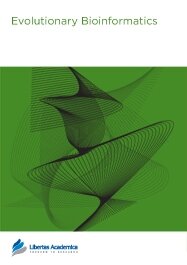

Publication Date: 15 Nov 2011
Type: Original Research
Journal: Evolutionary Bioinformatics
doi: 10.4137/EBO.S8321

Abstract: Hypotheses about horizontal transfer of antifreeze protein genes to ice-living diatoms were addressed using two different statistical methods available in the program Prunier. The role of diversifying selection in driving the differentiation of a set of antifreeze protein genes in the diatom genus Fragilariopsis was also investigated. Four horizontal gene transfer events were identified. Two of these took place between two major eukaryote lineages, that is from the diatom Chaetoceros neogracile to the copepod Stephos longipes and from a basidiomycete clade to a monophyletic group, consisting of the diatom species Fragilariopsis curta and Fragilariopsis cylindrus. The remaining two events included transfers from an ascomycete lineage to the proteobacterium Stigmatella aurantiaca and from the proteobacterium Polaribacter irgensii to a group composed of 4 proteobacterium species. After the Fragilariopsis lineage acquired the antifreeze protein gene from the basidiomycetes, it duplicated and went through episodic evolution, characterized by strong positive selection acting on short segments of the branches in the tree. This selection pattern suggests that the paralogs differentiated functionally over relatively short time periods. Taken together, the results obtained here indicate that the group of antifreeze protein genes considered here have a complex evolutionary history.
PDF (653.63 KB PDF FORMAT)
RIS citation (ENDNOTE, REFERENCE MANAGER, PROCITE, REFWORKS)
BibTex citation (BIBDESK, LATEX)
XML
PMC HTML
I must say publishing with Evolutionary Bioinformatics was a great and partially unexpected experience. It allowed me to understand the name 'Libertas Academica' is not just a name but a real issue. The reviewers offered us stringent, rigorous but totally unprejudiced comments, the editor supported us and the paper visibility was very good. Thank you again.

All authors are surveyed after their articles are published. Authors are asked to rate their experience in a variety of areas, and their responses help us to monitor our performance. Presented here are their responses in some key areas. No 'poor' or 'very poor' responses were received; these are represented in the 'other' category.See Our Results
Copyright © 2013 Libertas Academica Ltd (except open access articles and accompanying metadata and supplementary files.)
FacebookGoogle+Twitter
PinterestTumblrYouTube